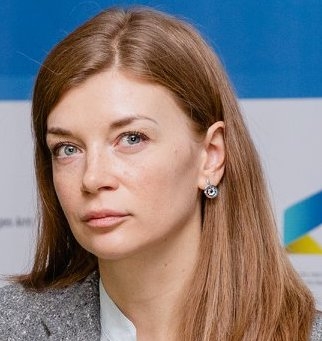European Economic
and Social Committee
Nadija Afanasieva: Working together to build a strong and secure Ukraine
Celebrating the New Year with friends and family, making wishes and plans for 2022, nobody in the world expected our lives to change so dramatically in just a few months.
The first time Ukraine saw the face of war since its independence was in 2014.
During the Revolution of Dignity, more than 100 people were shot on Maidan Square. Then came the invasion of Donbas and the annexation of Crimea. Ukrainian civil society was transformed significantly in 2014: volunteers went to the frontline, helping IDPs and supporting injured soldiers. We thought those were the darkest days of our history, but we were wrong.
In 2014 our society's division over whether we should join the EU or not practically disappeared. The last opinion poll before the invasion in February 2022 showed that a significant 68% of Ukrainians were in favour of EU membership for Ukraine; support grew to 86% just after the invasion and reached 91% by the end of March - an absolute record!
This massive backing is a reaction to what EU civil society has been doing to help. It mobilized immediately and pushed EU governments to make rapid decisions. The role of volunteers, who have been working from the first hours of the invasion, has been enormous. Their superpower is that they can find quick solutions to any problem, from ammunition and drones to medicines and clothes for refugees. The wave of demonstrations and the huge numbers of yellow-blue flags waved across the EU were incredible. As we hid in shelters, we found strength in the photos of people all over the world supporting Ukraine.
The majority of our partners started calling soon after they got the news of the massive air strikes all over Ukraine, asking: "how can we help?". We received a lot of help, but we need more.
The army needs innovative solutions and technologies to win the battle; doctors of all specialisations need contemporary equipment and staff to help injured soldiers and civilians; volunteers need even more contacts all over the world; etc.
But we also need a strategic vision of the recovery process in Ukraine, and here the common efforts of the whole democratic world to build a strong and secure state and develop innovative solutions in constructions, infrastructure organisation, business and science support, capacity-building for the institutions of different levels, etc play a crucial role.
Both Ukrainians and the EU have learnt very clear lessons from this war:
- Some situations require urgent solutions, especially as regards common security issues.
The war started in 2014 and for 8 years Ukrainians have been explaining the danger of close relations with Russia, dependence on Russian energy resources and other products from a country which spends its revenues on terrorism and acts of massacre. Still, neither Ukraine nor the EU were ready for such cruel and full-scale invasion, otherwise we would have both shown more determination. Would the invasion have taken place if the sanctions imposed in 2014 had been as harsh as those of 2022?
- The war in 2022 is also a war of innovation and technology. For sure, if we increase energy efficiency, diversify energy sources, find new digital solutions, develop space technologies and improve the way we manage our natural resources, etc., our level of independence and security will be higher than now, when all countries are experiencing a serious crisis.
Recognising the importance of an immediate response from politicians, diplomats, military forces, volunteers and civil society set us on a path to win the battle. The need for support is still enormous, but the motivation grows stronger every day.
We Ukrainians have proved that our main values are human dignity and freedom, democracy and equality, rule of law and human rights. There was never any fast-track procedure for EU membership, but the situation of Ukraine is exceptional, and probably it is time to rethink the procedure.
Ukrainians are fully aware of the volume of homework they need to do to join the EU. Our strength is our motivation to build a free state and form partnerships with those who have stood by us in the hardest times. And so we hold out, with trust in our armed forces and the vision of a prosperous country.
Nadija Afanasieva, director of Ukrainian Institute for International Politics in Kyiv, Ukraine
